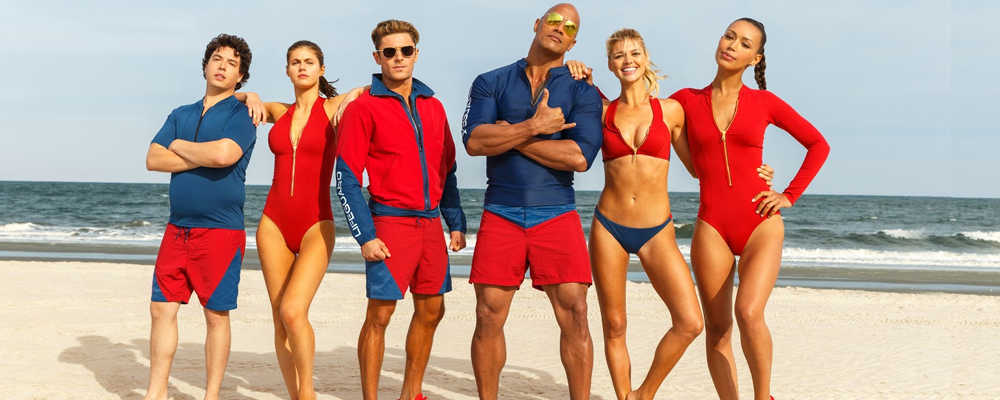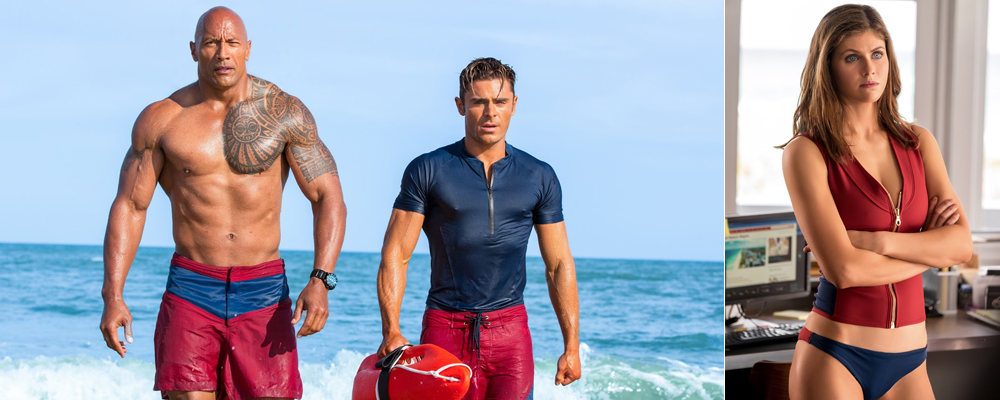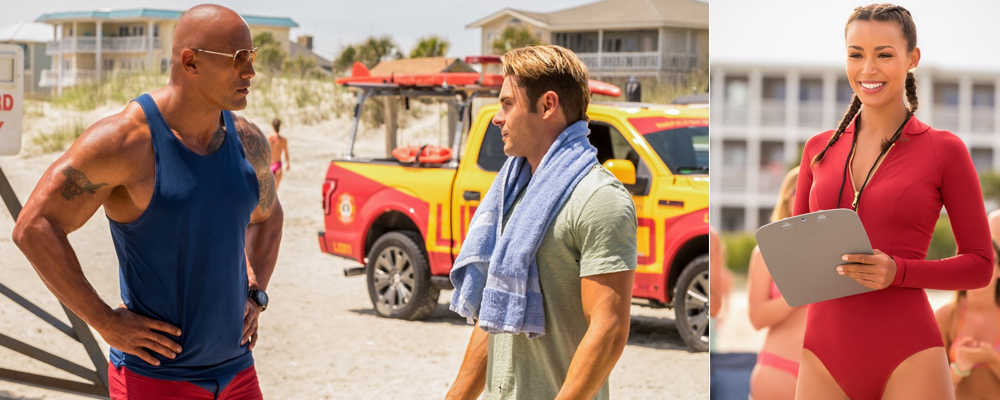‘Baywatch’ Is Not Funny Enough to Subvert Its Own Sexism
Allyson Gronowitz
There are two types of films these days: unnecessary reboots that offer fresh takes on hackneyed brands, and unnecessary reboots that do not. “Baywatch,” based on the hypersexualized television show from the ‘90s, falls into the latter category. Directed by Seth Gordon (“Horrible Bosses”) and headlined by hunky funny-men Dwayne “The Rock” Johnson and Zac Efron, “Baywatch” boasts a magnetically alluring cast and a couple of self-referential digs. Still, it’s not quite funny enough to make up for the old-time Hollywood tropes it flaccidly attempts to subvert.
Johnson is Mitch Buchannon (originally played by David Hasselhoff), the idolized leader of an elite lifeguard squad who saves lives and melts hearts on the regular. Muscles bulging, bald head gleaming, Mitch embarks on his daily beach run and, in the process, intercepts a packet of drugs that washes up on the shore, critiques his sand-sculpture likeness, banters with frenemy cop Sergeant Ellerbee (Yahya Abdul-Mateen II), and makes a flyby appearance in a basketball game. When Mitch notices a windsurfer in need of rescue, “Baywatch” turns into a souped-up Mountain Dew commercial: as Mitch embarks on the daring rescue, euphoric, pump-up music blares, slow-motion action shots abound, and, when it’s all over, the disoriented windsurfer asks Mitch if he’s Batman. “Yeah, man,” Mitch answers. “Just bigger and blacker.”
The scene is just cool enough to be fun and just campy enough to be funny. (As is another sequence in which dozens of swimsuit-clad beach-goers compete to qualify for a coveted spot in the lifeguard squad.) But after that, “Baywatch” quickly loses its mojo. For this type of movie, the humor that earns the most laughs is also the most self-referential, such as throwaway lines about the lifeguards running in slow-mo and a quip about the evil machinations of the local villain sounding like something from a crappy television show. When former Olympian Matt Brody (Efron) is brought in by Mitch’s boss to amp up the lifeguarding crew’s image (as if it needs much of a lift…), Mitch refuses, in true macho-man fashion, to call Brody by his real name. Instead, Mitch refers to him as a variety of tween-appropriate boy bands, and it only evokes something close to a guffaw when Mitch calls Brody “High School Musical” (which is, of course, the series that made Efron a household name).
But this Mitch-puts-Brody-in-his-place-by-calling-him-silly-names gag becomes especially grating when Mitch resorts to using feminized language to demean him. Mitch derides him as a “princess” and Brody’s eyes narrow; Mitch calls him a “mermaid” and Brody’s face displays quiet shock; Mitch makes a reference to Brody’s “mangina” and Brody looks positively affronted. Belatedly, the movie tries to make up for its blatant sexism by having a male character turn to the women present and flippantly say “no offense!” whenever someone addresses the group as “you guys,” but it reflects a limp attempt by the movie to call itself “woke.”
It’s a shame for the women involved because the actresses that carry this film are fabulous in their own right. Alexandra Daddario of “Percy Jackson” fame is sassy and sharp as recruit Summer, and Ilfenesh Hadera and Kelly Rohrbach are both stunning, smart, and athletic as Mitch’s respected co-lifeguards Stephanie and CJ. (Rohrbach is my personal MVP, especially considering she has big… shoes to fill as the character originally played by Pamela Anderson.) Bollywood superstar Priyanka Chopra, however, is forced into ridiculous dresses as Victoria Leeds, the woman responsible for a drug- smuggling operation that Mitch and his buddies are intent on exposing. Leeds fancies herself a Bond villain, uttering lines such as “Teach him some manners!” and “What do we do to people who don’t deliver?” but she’s too pouty and seductive to be anything more than a caricature of better roles.
Interestingly enough, in another genre entirely, Brody’s story could be compelling. His party-boy backstory—one that evokes a certain other infamous U.S. Olympic swimmer in a way that is not even supposed to be subtle— is peppered with foster care fiascos and the all-too-real financial struggles that often plague professional athletes. And Efron, a rising comedic actor but underrated as a dramatic actor, is the perfect person to play a character for the “more than just a pretty face” arc. But “Baywatch” giveth and “Baywatch” taketh away: poor Ronnie Greenbaum (Jon Bass) steps into a role that is all stereotype as the lovable but schlubby Jewish nerd who pines for the hot blond and gets himself into embarrassing jams. At first, it seems like the movie will dispel the trope when, after earning a coveted lifeguard spot with Mitch’s crew, Ronnie fearfully asks if he’s just the “tech guy,” and the smiling beach babes assure him that he’ll be a full-fledged member of the team. But later on, Ronnie ends up doing just that.
“Baywatch” also tries to hammer home the idea of selfless commitment to a team and an ideal through rousing speeches about the importance of family. It’s tough to take seriously, though, when two massive franchises—“Guardians of the Galaxy” and “The Fast and the Furious”— have already tackled the topic this summer. (Which film had the better Hasselhoff cameo, though? Up for debate.) So the movie resorts to dick humor and entire patches of dialogue-surrounded breasts, and of course, the capable, no-bullshit girls end up with the drooling guys who objectify them. At least lifeguards get a cool rep.
“Baywatch” will be released in theaters nationwide on May 26.




